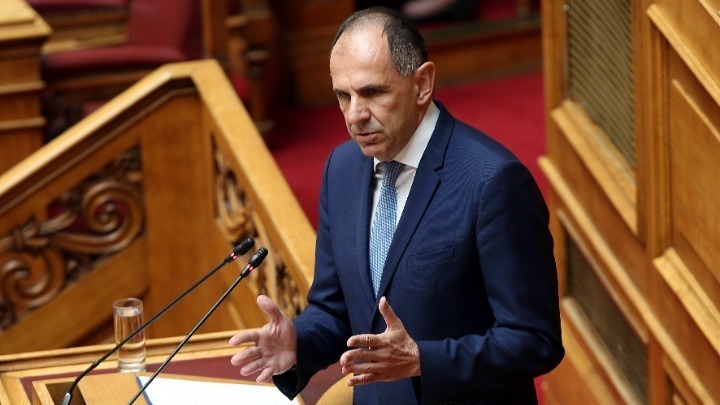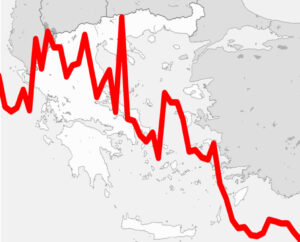Greece’s foreign policy will focus in three directions, new Foreign Affairs Minister George Gerapetritis said in Parliament on Saturday, outlining them as: active international relations, multi-faceted international presence, and extroverted diplomacy.
During the government’s presentation of policy programs to Parliament plenary on the last day of a debate begun Thursday, Gerapetritis also welcomed Finland’s membership to NATO and expressed support for Sweden’s immediate one as well. He also said that Greece will continue supporting Ukraine and hoping for a speedy resolution to the conflict and Ukraine’s full restoration of its territorial integrity. In addition, he expressed Greece’s focus on supporting the Greek communities in Ukrainian cities.
Gerapetritis spoke of the volatility of the Western Balkans and the threats in the region undermining their European prospects, and noted that Greece will remain committed to their EU accession prospects. For Albania in particular, he said Greece will do whatever it can to ensure the release of Fredi Beleri, the elected mayor of Himare who is held in jail over unread charges of voter bribery.
Gerapetritis also spoke of Greece’s role in the East Mediterranean region, and the commitment to strengthening the ties with the Greek diaspora.
Mitsotakis-Erdogan
In terms of Turkiye, he said Greece looks forward to good neighborly relations with the country and is working toward “the restart of talks and the development of a positive agenda through the Confidence Building Measures and the boosting of economic collaboration.”
He noted that Prime Minister Kyriakos Mitsotakis will meet with Turkish President Recept Tayyip Erdogan in the context of the NATO Summit in Vilnius on July 11 and 12, adding that he himself would “try to build a relationship of mutual respect with my Turkish counterpart.”
In addition, speaking of bilateral Greek-Turkish relations, he said, “Greece seeks the resolution, based on the Law of the Sea (UNCLOS), of the only diffence between the two countries: the delimitation of the Exclusive Economic Zone and of the continental shelf, on the exact model of the agreements it has already signed with Italy and Egypt, and hopefully shortly with Albania as well. The continuing postponement of these issues to a future date does not benefit either of the two countries,” he said.
Gerapetritis also said Greece would never accept fait accomplis on the field in Cyprus, nor will it ever accept a resolution of the Cyprus issue leading to two separate countries.
Responds to questions
Responding to questions by the opposition parties on the government’s unnegotiable points, he said that territorial “sovereignty now lies at 6 nautical milies; Greece retains the inelianable, exclusive, and unilateral right to extend its territorial waters to 12 miles whenever it sees it as fit and necessary.” The FM asserted that “we will not discuss issues that relate to the demilitarization of the islands – these issues are related to the country’s sovereignty and are excluded from any discussion and negotiation. We are not discussing issues related to our sovereignty, I want to be very clear about this.”
Gerapetritis also added that “revisionism is unacceptable by the Greek state,” and underlined that “it is not possible, nor would it be legally possible, to change the circumstances on which the present status quo is based, such as the Treaty of Lausanne and the Montreux Convention.”
Speaking of the issue of West Thrace and influence by the Turkish consulate there, he told opposition parties that “it is not a foreign policy issue, it relates to the Greek domestic law and order.” He further underlined, referring to the Greek Muslim minority in the region, “We do not recognize the right of any foreign factor to express opinions on issues related to Greek citizens.”
On the Prespes Agreement with the Republic of North Macedonia, he said that the agreement “contains serious imperfections and defects which could lead to issues,” but added that the government is “closely following the execution of the agreement, and we shall do what our national interest dictates.” The agreement itself cannot be amended, since it is international in nature and has been approved by the Greek Parliament, he explained, therefore supersedes formal Greek laws.










